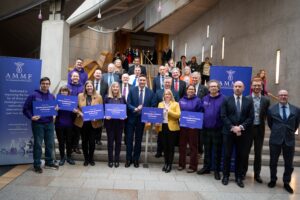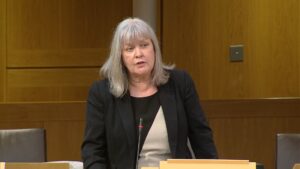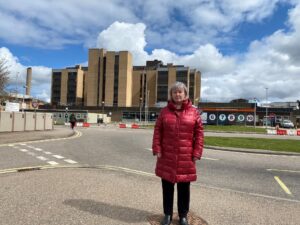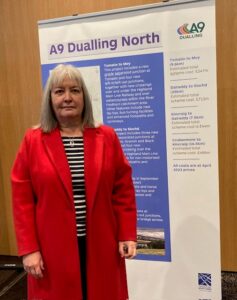Highlands and Islands Labour MSP, Rhoda Grant, who has been leading cross party efforts to ensure local Women’s Aid groups are properly funded is trying again in a bid to get a reply from the leadership of Highland Council on this deeply troubling situation.
On behalf of a group of MSPs and election candidates, Mrs Grant asked for an urgent meeting with the leadership of Highland Council on 20 January. She followed this up by tabling a question during First Minister’s Questions on 5 February and has tabled a further question in the Scottish Parliament this week to try to get answers.
Mrs Grant convened a cross party meeting with other Highland MSPs and some local election candidates last month in a bid to get the leadership of Highland Council to address the severity of the situation being faced by Women’s Aid in the Highlands and the impact this is having on the essential, specialist services they deliver.
During Highland Council’s Health, Social Care and Wellbeing Committee meeting earlier this month (04.02.2026) it agreed to revisit the question of the funding of Refuges at a meeting in August with no assurance given on the future of MARAC funding. Mrs Grant raised the issue during First Minister’s Questions the following day (05/02/2026).
The First Minister reiterated the Scottish Government’s commitment to preventing and eradicating violence against women and girls and said he would ask the relevant Minister to write to the Leader of Highland Council to request engagement with cross party MSPs on this important issue. To date however, Mrs Grant has not received a reply from Highland Council about this and has therefore tabled a further question in Parliament in a bid to move the issue forward.
Rhoda Grant said “MSPs from across the Highlands have joined forces to try to get clarity and sufficient funding allocated to allow Women’s Aid to continue to provide the level of services they provide at present. We asked for an urgent meeting with the Leaders of Highland Council. Instead what we have got is nothing. No reply, no assurance that these services will be protected.
“I know Councils throughout the region are grappling with the reduced funding they are being provided with from the Scottish Government but the women who are fleeing domestic abuse with their children should not bear the brunt of this. They must be properly supported during one of the most harrowing times of their lives and they should know they will be supported by Women’s Aid when they take the very brave decision to leave their abuser.
Mrs Grant continued “In tabling this further question we are trying again to force an answer from the leadership of Highland Council who have a duty to protect these women and children.”
The Women’s Aid groups in the Highlands have moved from stable Service Level Agreements to a gruelling procurement process that has left them facing significant funding cuts for outreach services. Refuge contracts in the Highlands have only been guaranteed until September 2026, and funding for the MARAC process which protects those at the very highest risk of murder or serious harm remains precariously uncertain.
Mrs Grant’s latest question is copied below and is due for answer on 9 March. Her email to Highland Council requesting an urgent meeting with the Chief Executive and the Leader is also copied below.
Question reference: S6W-43874
Asked by: Rhoda Grant, MSP for Highlands and Islands, Scottish Labour
Date lodged: Monday, 23 February 2026
Current Status: Answer expected on 9 March 2026
To ask the Scottish Government, further to the answer to question S6F-04638 by John Swinney on 5 February 2026, and his commitment to contact the Highland Council regarding the funding of domestic abuse services in the Highlands, whether it has made this contact since then, and, if so, whether it will provide an update on any discussions.
From: On Behalf Of Grant R (Rhoda), MSP
Sent: 20 January 2026 17:38
To: chief.executive@highland.gov.uk; Raymond Bremner (Councillor) <Raymond.Bremner.cllr@highland.gov.uk>
Cc:
Subject: Domestic abuse services in the Highlands
Dear Derek and Raymond
Many concerns have been raised with me over recent weeks regarding the funding and future operational models of domestic abuse services in the Highlands. The level of concerns raised prompted me to convene a meeting with the four Women’s Aid groups, Highland MSPs and Scottish Parliament election candidates in the region to discuss these concerns.
The meeting, which was attended by representatives of all of the main political parties in the region, highlighted that there are real concerns over proposed funding for Women’s Aid groups in the Highlands for 2026/27 along with concerns raised about the processes being adopted by Highland Council which were described as “unclear and disingenuous”. Emma Roddick MSP was unable to attend the meeting but has already voiced her concerns on this. Angus MacDonald MP was also represented at the meeting. Indeed, it appears that many Highland Councillors are in the dark about what is happening themselves.
The mood of the meeting was clear that the specialist Outreach, Refuge and MARAC funded services provided by Women’s Aid in the Highlands are essential with the current uncertainty placing undue pressure on services going forward and on the staff members involved. Everyone present at Friday’s meeting agreed to work cross-party in a bid to bring these concerns to the attention of senior management of Highland Council.
Given that time is of the essence with current contracts and some funding levels only in place until the end of March, we ask you therefore to meet with us urgently as a collective to discuss this worrying situation and to provide clarity on the funding levels, legality and processes relating to this.
Best wishes.
Rhoda
Signed on behalf of:-
Fergus Ewing MSP, Maree Todd MSP, Kate Forbes MSP, Ariane Burgess MSP, Edward Mountain MSP, Emma Roddick MSP, Angus MacDonald MP, Malcolm Heughan, Andrew Baxter, Neil Alexander (Scottish Liberal Democrats), Eilidh Munro (SNP), Shaun Fraser, Isla McCay, Eva Kestner (Scottish Labour)
Rhoda Grant MSP
Highlands and Islands Regional MSP
Shadow Cabinet Secretary for Rural Affairs, Land Reform and Islands





